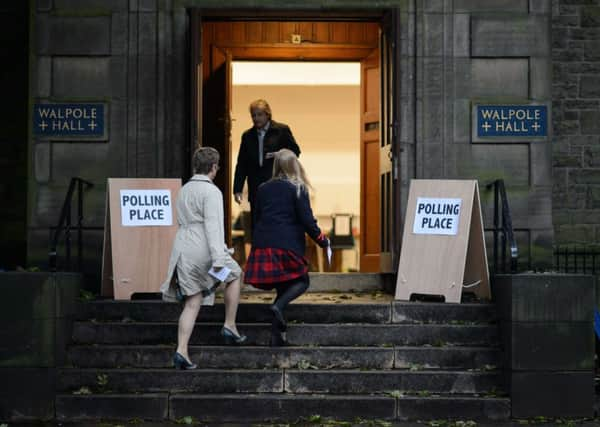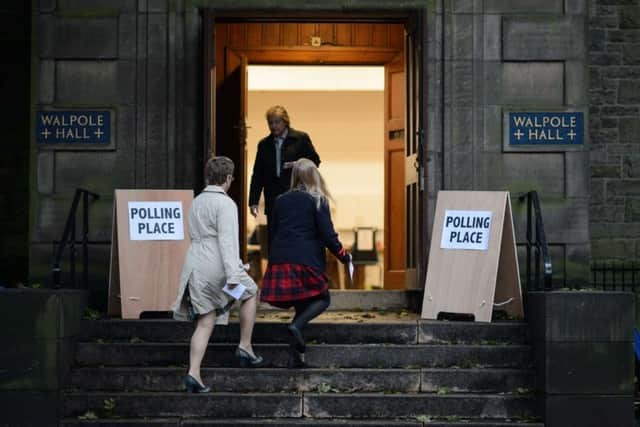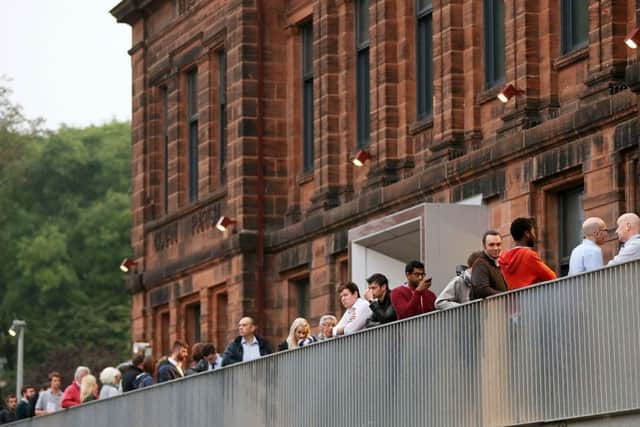Scottish independence: Voters turn out in droves


Queues began outside some polling stations as early as 6am - an hour before the polls opened - as eager voters rushed to cast their ballot papers before the start of the working day.
A total of 4.3 million people are registered to vote - 97 per cent of those eligible - with turnout set to be at a record high. By 10am, 18.5 per cent of registered adults in Scotland had already cast their vote - nearly a fifth of the voter base.
Advertisement
Hide AdAdvertisement
Hide AdA poll released this morning from Ipsos Mori claimed that as many as 95 per cent of the electorate are expected to vote, including 90 per cent of those aged 16-24. The poll also revealed that the decision remains on a knife edge, as 53 per cent of certain voters said they intend to vote No, with 47 per cent to vote Yes.


The latest polling figures mirror those from previous surveys released in the days running up to the referendum.
Voters at Scotland’s polling stations reported that some ballot boxes were already full, while others spoke of long queues outside venues to get the chance to vote.
“I’ve waited all my life for this,” said the first voter in Edinburgh’s Waverley Court, a businessman who gave only his first name, Ron. “It’s time to break with England. ‘Yes’ to independence.”


As he spoke, a couple of workers hurrying by in the morning mist and drizzle shouted “Vote No!”
In Dunblane, the polling station car park overflowed, causing a traffic snarl-up through the town, while in Edinburgh’s Craigmillar, a piper led voters through the streets to the polling station.
One church acting as a polling station - St Phillips and St James in the capital’s Inverleith district - included arrows on its sign to point people in the right direction: to either “vote” or “pray”.
Advertisement
Hide AdAdvertisement
Hide AdIn Glasgow, where George Square is host to ongoing Yes campaign rallies, there was a carnival-like atmosphere, with some people wearing blue-and-white face paint. A Scottie dog wearing a blue coat was also present.
A man running a financial services business and a hotel on the Isle of Skye had returned to the city, where he has his permanent home, to cast a “No” vote. “I think it’s a great concept, but working in finance I can see the difficulties,” he said.
Meanwhile, clusters of campaigners and election watchers gathered at points in Scotland’s cities to soak up the atmosphere of the day when Scotland will make its biggest ever political decision.
Landmarks across the country have been adorned with campaign paraphanalia, including the Queen Victoria statue in Leith, which is now sporting a large Saltire as a cape - and the Donald Dewar statue on Glasgow’s Buchanan Street, which, contrary to the late First Minister’s political leanings, currently wears a Yes badge on his lapel.
Pamela Haye, 50, from Edinburgh, headed to the Scottish Parliament at Holyrood to mingle with the crowds on the historic day.
“It’s a momentous occasion,” she said, sitting among groups of tourists, campaigners and election watchers from across the globe. “I wanted to experience it. It is amazing how much interest it has sparked all over the world.”
The Scottish Parliament at Holyrood has become a destination for people keen to feel part of the referendum. Tourists and Scots alike clustered around the entrance to the Parliament, with some waving Saltires and others toting campaign material.
The area outside of the Parliament was last night occupied by up to 1,000 Yes campaigners, who rallied outside of the international media tent in front of Arthur’s Seat.
Advertisement
Hide AdAdvertisement
Hide AdCars hooted their horns in support as they passed by, while one tiny Seat 600 vehicle - decorated in the Catalan flag and packed with three fire fighters who undertook a three day journey from Barcelona to experience Scotland’s referendum - was playing the national hymn of the Spanish territory.
Susan and Eric Jones from Dunfermline said they had cast their vote at a busy polling station close to their home early this morning before heading to Edinburgh to experience the historic event.
“I feel the whole thing is quite traumatic,” said Mrs Jones. “We were born in England, but have lived here for 42 years. We are British and have always been proud of being British. It is not being thought through. I am terrified of what the outcome will be. This is people’s lives - and their children’s and grandchildren’s lives. I just hope people see sense.”
The key players in both campaigns turned out to cast their votes early, with all four appearing relaxed and smiling as they claimed to have “slept well” the night before the poll.
First Minister Alex Salmond turned up to vote in his Aberdeenshire constituency with two first time voters - 18-year-old Natasha McDonald and Lea Pirie, 28.
He gave both women a soft toy emblazoned with the Yes logo as a memento of the historic day.
“We’re in the hands of the people of Scotland and there’s no safer place to be than in the hands of the Scottish people,” he said.
Nicola Sturgeon headed to her Glasgow polling station where she gave a brief wave to wellwishers before heading inside.
Advertisement
Hide AdAdvertisement
Hide AdShe expressed her thoughts on Twitter soon afterwards. “I’ve just voted #Yes to Scotland becoming an independent country. What a wonderful feeling,” she wrote.
Better Together leader Alistair Darling was greeted by a mixture of cheers and boos as he arrived with his wife, Maggie, at the Church Hill Theatre in Edinburgh to cast his vote.
He said: “I’m feeling very confident. It’s been a long, hard two-and-a-half year campaign, passions have been aroused on both sides, and understandably so because we are talking about the biggest single decision that any of us will ever take in our lifetime.
“But I’m increasingly confident that we will win tonight.”
Former prime minister Gordon Brown chatted to supporters as he made the short trip to his local polling station in North Queensferry, Fife.
“Thanks very much for all the help you have given,” he told them.
Scottish Labour leader Johann Lamont also tweeted her reaction to the polls.
“Voted No for my family and with my family. Son cast his first vote today for a #LabourNo,” she said, posing for photographs with her family, including 16-year-old son Colin, who voted for the first time and 18-year-old daughter Fay.
Scottish finance secretary John Swinney said he had cast his vote at his local polling station in Perthshire.
Advertisement
Hide AdAdvertisement
Hide Ad“This morning in Burrelton Village Hall I had the privilege of voting Yes,” he tweeted. “Thank you to all who have worked so hard to make this possible.”
Green leader Patrick Harvey, a Yes campaigner, tweeted his delight at the fact he was having to queue at 11am to cast his vote.
“I’m queuing to vote. *Queuing*!” he wrote.
The Ipsos Mori poll said that including those who are still undecided, 50 per cent say they will vote No, with 45 per cent saying they will vote Yes and the remainder still unsure which way they will vote.
The survey found that the majority of Scots on both sides say they based their vote more on practical consequences than feelings of national identity.
Seven in ten Yes supporters based their vote more on practical consequences, with 78 per cent saying the same from the No campaign. Meanwhile, a quarter of Yes supporters based their vote more on national identity, compared with 15 per cent of No voters.
Gideon Skinner, Head of Political Research at Ipsos MORI, said: “These results confirm the picture from other polls before polling day – the referendum looks extremely close, and although No seems to have a small lead much will depend on turnout on the day.
“Meanwhile there is a clear difference in the motivations for voters on the two camps – Yes voters saying they are motivated more by hope for the future if their side wins, while No voters say fear for the future if the No side loses has been more important to their vote.”
Advertisement
Hide AdAdvertisement
Hide AdThere are around 2,600 separate polling places across Scotland - the majority of them in schools, church halls and community centres, but others based at more unusual locations. Extra polling stations to those used in a normal General or Holyrood election have been opened to meet the greater demand for a vote in the referendum.
A caravan catering for just 52 voters is open for the duration at Balmacara, near Kyle of Localsh, while the house of the head teacher at Paible school in North Uist is also being used as a polling station.
In Edinburgh, the luxury Roxburghe Hotel is one of the more plush places people can go to vote, with a mobile library possibly one of the most basic - while in Stranraer, locals are headiong to a fire station to cast their ballot.
Voting, which opened at 7am, will continue until 10pm tonight, when ballot boxes will be collected up for a long night of counting.
The question on the ballot paper: “Should Scotland become an independent country?”, offers only two options, ‘Yes’ or ‘No’.
The number of ballot papers in each box will be counted by a 5,767-strong counting team and the total will be reported to the chief counting officer (CCO) who will authorise the local counting officer to announce the turnout.
The papers will be sorted into Yes, No and those deemed ‘doubtful’. These will need to be judged and possibly rejected as spoiled.
The Electoral Management Board of Scotland has predicted that the official result will be announced between 6.30am and 7.30am tomorrow at the Royal Highland Centre at Ingliston.